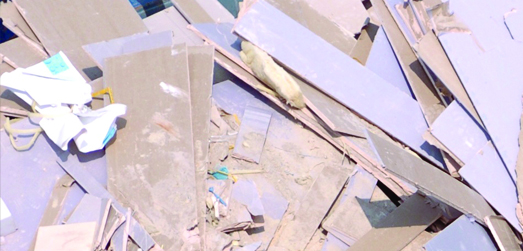An investigation by SpecFinish into illegal dumping of gypsum waste has discovered that it is largely going unprosecuted.
 As specialist contractors struggle to cope with increasing restrictions on where gypsum waste can be sent, the probe shows that the Environment Agency has not brought a single prosecution solely for the illegal dumping of gypsum waste anywhere in England in the last five years.
As specialist contractors struggle to cope with increasing restrictions on where gypsum waste can be sent, the probe shows that the Environment Agency has not brought a single prosecution solely for the illegal dumping of gypsum waste anywhere in England in the last five years.
Mark Hatfield, chairman of the Gypsum Re-processors Association UK and Ireland (GRAUKI), was not surprised by the findings of the SpecFinish probe and said that specialist contractors are becoming increasingly disenchanted by how illegal dumping of plasterboard is being ignored.
“One high profile prosecution of [gypsum dumping] would solve a lot of problems for a lot of people, including the Environment Agency,” said Mr Hatfield.
SpecFinish filed Freedom of Information (FoI) enquiries with the three bodies responsible for environmental regulation across Britain asking how many prosecutions had been brought solely for illegal gypsum dumping since 2010.
The Environment Agency has brought prosecutions for illegal dumping of waste including plasterboard, but none solely for gypsum, according to a response to the FoI. “We have searched our prosecution databases and found no instances in which we have taken prosecution action in respect of illegal dumping of gypsum,” said the Environment Agency in their initial response to the FoI.
The Environment Agency suggested that local authorities “take the majority of actions in respect of fly tipping and small scale illegal dumping” but SpecFinish also submitted FoIs to the relevant agencies in Scotland and Wales and these showed a very different approach to the monitoring of illegal gypsum dumping.
In Scotland, the Scottish Environment Protection Agency (SEPA) has achieved six successful prosecutions for illegal dumping of waste that included gypsum according to the results of another FoI submitted to SEPA.
No successful prosecutions were achieved by SEPA in 2014, but the agency has previously secured prosecutions with penalties ranging from community service to fines totalling hundreds of thousands of pounds.
In 2012, a Midlothian man was given 160 hours of community service after being convicted of burning a mixture of wood, plastic, fibreboard, plasterboard and other mixed waste on a 30 square metre patch. The same year, a Falkirk man was fined £750 for illegal burning of waste.
The biggest punishment secured by SEPA was in 2012, when Doonin Plant was fined £200,000 for keeping hundreds of tonnes of controlled waste, including gypsum, at a site within the former Woodend Colliery in Armadale. This followed previous convictions of Doonin Plant for environmental offences, including a 2010 fine of £90,000.
Overall, SEPA’s records show two prosecutions in 2013, three in 2012 and one in 2010, all for illegal disposal of waste including plasterboard.
The biggest type of waste illegally dumped is construction and demolition waste and this typically includes some plasterboard, but there is no specific offence for the illegal dumping of gypsum waste, so the Environment Agency says it does not record this.
Natural Resources Wales does not monitor prosecutions specifically for gypsum dumping either, but the NRW is at least in the process of developing an IT system that will make this possible.
In England, specialist contractors are becoming increasingly frustrated by what they feel is a lack of specific action by the Environment Agency over illegal gypsum dumping, which contractors claim is on the rise due to the rising cost of legal recycling.
There is believed to only be one monocell site operational in the UK for the dumping of gypsum and, with contractors no longer able – for now – to recycle waste onto farmland, this, said Mr Hatfield, is fuelling illegal dumping and making attempts to recycle by legitimate contractors increasingly pointless.
“You quote to recycle board, but there’s no point as it’s always being chucked in a field or a quarry without any punishment, so what’s the point?” added Mr Hatfield, who also sits on the Plasterboard Sustainability Partnership board.
In a second response to the FoI, the Environment Agency said there have been several prosecutions for waste related offences that involved gypsum and/or plasterboard but again confirmed that none had been focused solely on gypsum.
The agency said: “Waste companies and businesses have a duty of care to ensure that [disposal] is managed properly and the Environment Agency uses a range of measures to ensure that operators comply with the law, including enforcement notices, civil sanctions and prosecutions where necessary.”
The Environment Agency’s lack of engagement on illegal gypsum dumping is evident from its involvement with GRAUKI, which last met in February. No agency representative attended and the agency would not comment on why.


